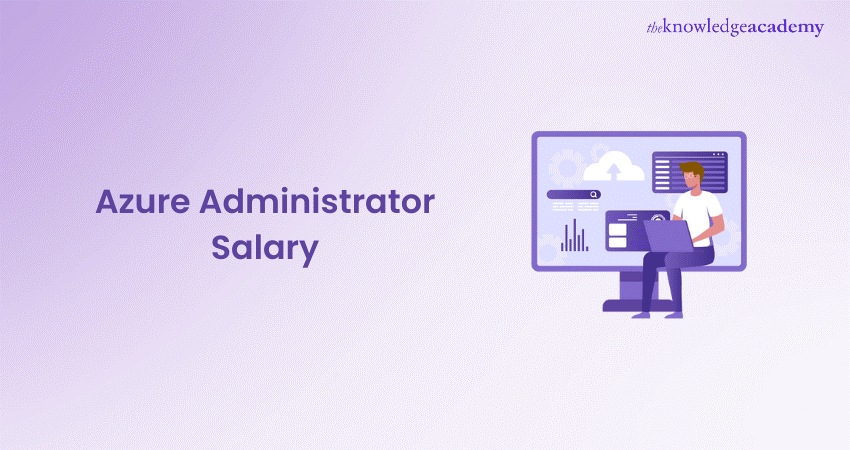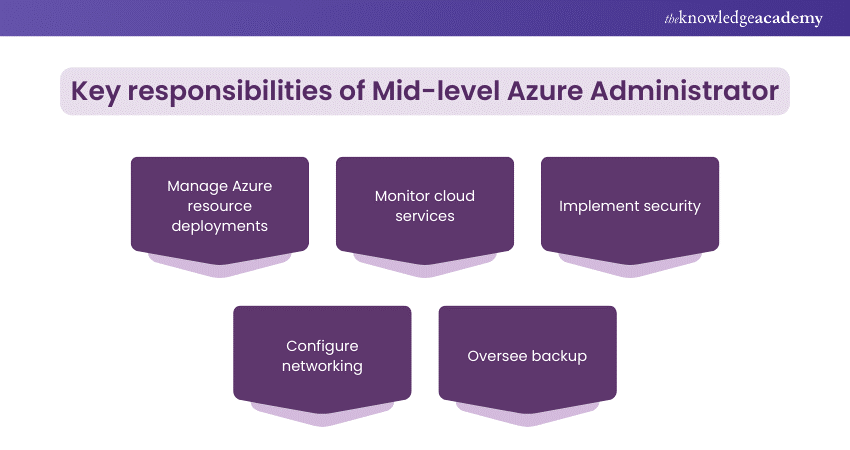We may not have the course you’re looking for. If you enquire or give us a call on +971 8000311193 and speak to our training experts, we may still be able to help with your training requirements.
We ensure quality, budget-alignment, and timely delivery by our expert instructors.

In today’s world there is a rapid adoption of Cloud Computing services across every industry and organisation. This area of service is quite lucrative and if you want to be a part of this upcoming industry, then a role as an Azure Administrator will suit you the best. An Azure Administrator Salary is one of the most important factors behind choosing this career.
These professionals are pivotal in deploying, managing, and overseeing the infrastructure of Cloud services provided by Microsoft Azure. The salary of an Azure Administrator varies widely, influenced by factors such as geographical location, level of experience, and the size of the organisation employing them.
If you want to know in detail the salary ranges for this career, this blog will discuss all the essential components of an Azure Administrator Salary. So, what are you waiting for? Read further to learn more!
Table of Contents
1) Who is an Azure Administrator?
a) Skills of an Azure Administrator
b) Job roles for Microsoft Azure Administrators
2) Compensation for Azure Administrators
a) Entry-level Azure Administrator
b) Mid-level Azure Administrator
c) Senior Azure Administrator
3) Conclusion
Who is an Azure Administrator?
An Azure Administrator is a computer specialist who handles cordial applications and infrastructure to provide services for Microsoft Azure Cloud. They are the owners of channelising, building, debugging and looking after Cloud networks, storage and machines. They guarantee that there is not any problem in the functioning of the Cloud environment. Along with executing these activities, they will also operate, enforce security policies, and optimise costs.
Apart from these, they also help resolve issues, which ensures continuity through backup and recovery process, and avail availability for standardisation consistency. An Azure Administrator is a key team member who ensures the smooth functioning of the two vital aspects of Azure, which are pivotal for organisations to achieve maximum benefits from Azure’s Cloud Computing environment in tandem with the organisational goals.
Skills of an Azure Administrator
Let’s look at some of the skills that are essential to become an Azure Administrator:
a) Cloud infrastructure management: Knowledge of how to set up, structuring and maintenance of Physical resources such as virtual machine, storage, and network in Microsoft Azure.
b) Identity and Access Management (IAM): The strong grasp of Azure Active Directory services like identity management, Role-based Access Control (RBAC), and Multi-Factor Authentication (MFA).
c) Security and compliance: Learning to apply security procedures such as Network Security Groups, encryption and firewall concepts.
d) Automation and scripting: Tools such as Azure CLI, PowerShell and ARM templates are used for automating task repetition and managing resources.
e) Monitoring and troubleshooting: Get Azure Monitor, Log Analytics, and Application Insights enabled to do system performance tracking and report issues.
f) Backup and disaster recovery: Microsoft Azure backup services utilised along with site recovery and replication techniques to effectively guard the vital business functioning.
g) Cost management: Scaling up or down the usage of resources and employing optimisation strategies to forecast in advance Cloud spending trends.
Learn how you can demonstrate proficiency in a leading Cloud platform like Azure with our Microsoft Azure Administrator AZ104 Course.
Job roles for Microsoft Azure Administrators
Let’s have a look at some of the most popular job roles for Microsoft Azure Administrators:
a) System Administrator: IT experts competent in Azure Microsoft technology who manage and oversee the Cloud computing system of companies are vital. They manage network architecture, make the connection between on-premises and Cloud invisible, and support the provision security system. One of their responsibilities is to closely watch performance of the system, identify problems and then solve them, and tune the resources accordingly for scalability.
b) Cloud Software Engineer: A Cloud software engineer who works using Microsoft Azure has the duty of creation and implementation of Cloud-based applications which involves designing of them, and deployment as well. They closely collaborate with architects and stakeholders to understand business needs and convert them into efficient Cloud solutions.
Learn the basics of Microsoft Azure with our Microsoft Azure AI Fundamentals AI-900 Training – join now!
Compensation for Azure Administrators
Microsoft Azure is a leading platform in this domain, and the demand for skilled Azure Administrators is rising as businesses seek experts to manage their Cloud infrastructure. Their compensation varies depending on several factors, including experience level, specific role responsibilities, location, and certifications. Here’s an in-depth look at how these aspects impact Azure Administrator compensation:
Entry-level Azure Administrator
Entry-level Azure Administrators usually have minimal work experience but are well-versed in fundamental Cloud computing principles and Azure basics. Their roles involve maintaining Cloud resources, managing user identities, configuring basic security settings, and monitoring Cloud performance.
1) Key responsibilities of Entry-level Azure Administrator
a) Setting up virtual networks and basic infrastructure components.
b) Monitoring system performance and managing backups.
c) Handling basic Identity and Access Management tasks.
d) Providing first-level support for common issues.
Mid-level Azure Administrator
Mid-level Azure Administrators usually have 3-5 years of experience and are responsible for more advanced Cloud operations. They typically oversee the deployment, management, and scaling of complex resources.
1) Key responsibilities of Mid-level Azure Administrator:

a) Managing identity, security, and compliance aspects with Azure Active Directory and RBAC.
b) Implementing network security groups, firewalls, and monitoring policies.
c) Developing automation scripts with PowerShell or Azure CLI.
d) Handling advanced troubleshooting and system performance optimisation.
Prepare smartly with the Microsoft Azure Fundamentals PDF. Download today to learn the essentials of Azure and start your journey toward certification!
Senior Azure Administrator
Senior Azure Administrators possess extensive experience and often have specialised knowledge in networking, security, or automation. Their roles are strategic, focusing on designing and implementing scalable, secure, and efficient Cloud environments.
1) Key responsibilities of Senior Azure Administrator:
a) Designing complex Cloud architectures to meet unique business needs.
b) Implementing automation strategies with Infrastructure as Code (IaC) tools like ARM templates or Terraform.
c) Ensuring compliance with security standards and regulatory frameworks.
d) Leading Cloud migration projects and overseeing disaster recovery strategies.
e) Mentoring junior administrators and contributing to team training.
Let’s see a brief comparison in salaries of Azure Administrator Salary according to their roles:
|
Role |
Average Salary |
|
Azure Cloud Engineer |
£54,398 |
|
Azure Cloud Solutions Consultant |
£70,000 |
|
Azure Systems Engineer |
£80,000 |
|
Cloud Architect |
£91000 |
Source: Glassdoor
This following table will show how the salary of Azure Administrator will differ from one country to the other:
|
Country |
Average Salary (per year) |
|
U.K. |
£65,000 |
|
U.S.A. |
$90,143 |
|
India |
INR 1,307,000 |
|
Australia |
$81,000 |
|
UAE |
AED 181k |
|
Canada |
$54,364 |
|
Singapore |
$4,005 |
Source: Glassdoor
Are you interested in learning how you can deploy Azure Virtual Desktop for efficient remote work solutions? Then register now for our AZ-140 Configuring and Operating Azure Virtual Desktop Course!
Conclusion
We hope that from this blog you get an understanding of the average Azure Administrator Salary that you can expect in a year as your compensation and choose your career accordingly. Understanding these differences in role-based compensation helps professionals like you, so that you can align your career growth to maximise earning potential.
Do you want to learn how you can design networking and access solutions? Join us now for our Designing Microsoft Azure Infrastructure Solutions AZ305 Course!
Frequently Asked Questions
Is Azure Administrator an easy career?

Learning to become an Azure Administrator can be complicated, with the vastness of Cloud Computing topics and services that need to be understood. The concept of mastery is based on knowing networking, security and resource management among other features.
How many days will it take to learn Azure Administrator?

The time needed to learn the role differs depending on the previous experience of the person. For IT savvy, a few months of intense study and experience should be enough. On the other hand, initial learners may need six months or more, having strengthened learning and projects, to gain the skills necessary for certification and real-life circumstances.
How many days will it take to learn Azure Administrator?

The Knowledge Academy takes global learning to new heights, offering over 3,000 online courses across 490+ locations in 190+ countries. This expansive reach ensures accessibility and convenience for learners worldwide.
Alongside our diverse Online Course Catalogue, encompassing 19 major categories, we go the extra mile by providing a plethora of free educational Online Resources like News updates, Blogs, videos, webinars, and interview questions. Tailoring learning experiences further, professionals can maximise value with customisable Course Bundles of TKA.
What is the Knowledge Pass, and how does it work?

The Knowledge Academy’s Knowledge Pass, a prepaid voucher, adds another layer of flexibility, allowing course bookings over a 12-month period. Join us on a journey where education knows no bounds.
What are related courses and blogs provided by The Knowledge Academy?

The Knowledge Academy offers various Microsoft Azure Certifications, including the Microsoft Azure Fundamentals AZ-900 Certification Course, Microsoft Azure Security Technologies AZ500 Training, and Designing and Implementing Microsoft DevOps Solutions AZ400 Training. These courses cater to different skill levels, providing comprehensive insights into Azure SQL Interview Questions.
Our Cloud Computing Blogs cover a range of topics related to Azure, offering valuable resources, best practices, and industry insights. Whether you are a beginner or looking to advance your Cloud Computing skills, The Knowledge Academy's diverse courses and informative blogs have got you covered.
Upcoming Microsoft Technical Resources Batches & Dates
Date
 Microsoft Azure Administrator AZ104
Microsoft Azure Administrator AZ104
Mon 3rd Mar 2025
Mon 12th May 2025
Mon 14th Jul 2025
Mon 6th Oct 2025
Mon 1st Dec 2025






 Top Rated Course
Top Rated Course



 If you wish to make any changes to your course, please
If you wish to make any changes to your course, please


